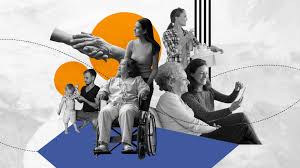By Adriana Hermosillo Almazán
Corporate Responsibility Coordinator
Telefónica Movistar Mexico
Who maintains the cycle of life while we produce? Who is responsible for caring for the elderly, children, the sick, and every living being that requires attention and care? Currently, the care system has been placed at the center of various conversations, both public and private. Politicians, civil society organizations, businesses, and decision-makers—all of them caregivers or those being cared for, whether they know it or not—have focused their attention on this issue, but despite this, it is not something new.
Various scholars on the subject have agreed that care was essential to shaping the evolutionary process of our species. Cases such as the discovery in the Shanidar Cave in Iraq, where according to an article published by National Geographic magazine, "the remains of an individual were found who, despite having a paralyzed arm, deafness, and a head injury that caused blindness, had lived longer than expected thanks to the care provided by the members of his group."[1] The compassion and bonds created within the tribes set the stage for evolution and therefore for the creation of a productive system where each member served as a key piece in carrying out hunting tasks and, over the years, developing human behaviors that we know today.
Thus, since time immemorial, it has been evident that the act of caring involves activities ranging from food preparation, maintenance activities, home upkeep, care of minors and the elderly, sick people or people with disabilities, among others. However, the vast majority have been attributed to the role of women and despite their importance, the social value and the economy of care remains mostly invisible.
But putting care at the center is not only about distributing tasks fairly between men and women, it is also about talking about the economy that sustains human activity. According to UN Women, the value of unpaid care work and domestic work represents between 10% and 39% of GDP; it can weigh more on a country's economy than the manufacturing industry, the trade sector, or the transport sector.[2]
Care is what makes it possible for the rest of the work to be carried out and for the links of life to be sustainable. Now, once the importance of revolving around care is understood, it is worth noting that, for its proper functioning, it requires collaborative work between governments, societies, and businesses to eliminate the obstacles that hinder its implementation.
In the words of The Care Collective, “We must reimagine the role of care in our daily lives and make it the organizing principle for all dimensions and stages of life. We all depend on one another, and only by fostering interdependencies can we create a world in which each and every one of us can live and, above all, thrive. Care cannot be limited to the personal and intimate—children, health, the elderly. We must overcome this limited interpretation of the concept.”[3]
Achieving a more humane world by connecting people's lives
At Telefónica Movistar México, we have sought to put care at the center, implementing policies that not only impact our employees but also achieve a more humane world by connecting people's lives. We aspire to digitize the entire society, leaving no one behind, and to reduce the digital divide due to access, affordability, accessibility, and digital skills training.
We know that caring also involves paying attention to all age groups, which is why we work on initiatives focused on empowering young people, seeking to bridge the gap between the classroom and the workplace. Our Dual Education initiative offers real opportunities for learning, growth, and professional development in partnership with the public sector, in this case the Ministry of Public Education (SEP). Our goal is to develop both interpersonal and technical skills, help them identify their strengths, and reduce early school leaving. Caring for and educating young people are intrinsically related; they complement each other and are essential for their comprehensive development.
We believe in the transformative power of collaboration to promote access to quality digital education, employability, and the development of key skills in the technological era. Our commitment is to foster equitable opportunities through technology, thus contributing to the progress of society.
That's why, through partnerships and collaboration agreements with the public and private sectors, centered on respect for and promotion of Human Rights and Digital Rights, we focus on offering workshops, talks, and training to bring technology closer to people and communicate its social impact. We know that care is fundamental and that, when accompanied by the conscious use of technology, it can be enhanced. Therefore, we promote awareness about how care is a value that is shared by all human beings, regardless of age, gender, or social class, and how technology can be a valuable tool to strengthen it.
With our customers in mind, we are working to transform our philosophy. We believe that technology should make us more human and that a great company is not measured solely by its coverage or network, but by its ability to listen, solve problems, and support. We want our responsibility to our customers to be geared toward building differentiated experiences based on trust. Because we work to facilitate connectivity and inclusion for all, we have accessible customer service processes for people with disabilities in all our service centers. Our postpaid contracts, Movistar Recharge, and SME plans are available on our portal in accessible audio, video with sign language, and PDF formats. In addition, our websites have a Web Accessibility Declaration in accordance with the Web Content Accessibility Guidelines 2.1 Level AA.
We care about the environment, which is why we also promote responsible design and offer EcoSmart solutions in our products and services, verified by the Spanish Association for Standardization and Certification. These solutions reduce energy and water consumption, lower CO2 emissions, and promote the circular economy.
We haven't forgotten that taking care of ourselves is essential to taking care of others. This is why we implement actions with our employees that focus on raising awareness through talks and workshops with experts on gender equality, new masculinities, and women's empowerment and economic autonomy; activities that promote well-being and work-life balance; benefits that have a direct impact on physical and mental health, such as: wellness programs to encourage healthy living through health days, discounts on medical studies, chats and telemedicine with specialist doctors, and vaccination campaigns; emotional balance through mindfulness breaks and active breaks; labor policies with benefits that go beyond those established by labor laws, paternity and maternity leave with more days than required by law, a hybrid teleworking model, and initiatives that promote learning and continuing education among our employees.
At Telefónica Movistar México, we are convinced that caring is not just an act of generosity, but a collective responsibility that we must all assume. Only those companies that integrate it into their culture will not only be more humane but also more competitive and sustainable.
[1] Shanidar Z, la mujer neandertal que vivió hace 75.000 años en el Kurdistán iraquí, National Geographic, en https://historia.nationalgeographic.com.es/a/shanidar-mujer-neandertal-que-vivio-hace-75000-kurdistan-iraqui_21285#:~:text=el%20Cuidado%20de%20sus%20enfermos,sus%20muertos%20hace%2075.000%20a%C3%B1os, consultada 23/06/2025.
[2] REDISTRIBUIR EL TRABAJO NO REMUNERADO, ONU Mujeres en https://www.unwomen.org/es/news/in-focus/csw61/redistribute-unpaid-work#:~:text=El%20valor%20del%20trabajo%20de,el%20del%20transporte%20%5B1%5D, consultada 23/06/2025.
[3] THE CARE MANIFESTO, The Care Collective, Bellaterra, 2021






